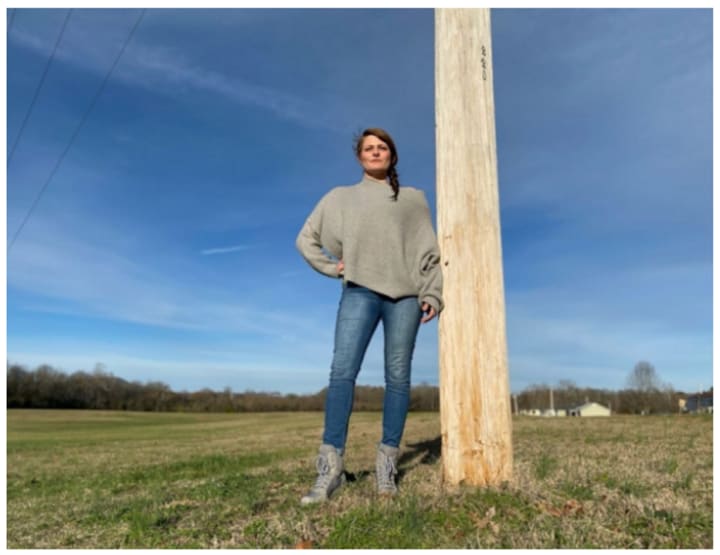Brittany Smith Stood Her Ground
Alabama put her on trial anyway and continues to traumatize her further at every opportunity

In the early morning hours of January 16, 2018, 32-year-old Brittany Smith stepped into a Stevenson, Alabama, Mapco station. Brittany’s neck was red and her face was stained with tears. She had what looked like blood on her chin and fingernail broken off, exposing blood on her pinky.
The Mapco attendant, Paige Painter, testified in court that Brittany looked like she’d been in a fight when she whispered to her and asked for a pen and paper. Brittany then wrote the name “Todd Smith” down on the piece of receipt paper she was given and handed it back to Painter, telling her that if anyone found her dead, he’d be the one who killed her and that he had raped and strangled her.
Later that morning, police were called to Brittany’s home, but it was 38-year-old Todd Smith who was found dead from multiple gunshot wounds. Two days later, Brittany was charged with his murder, despite her claims that he had raped and strangled her for hours before she shot and killed him in self-defense.
The charges left her facing life in prison if convicted. Instead, she asked Jackson County Circuit Judge Jenifer Holt to grant her immunity under Alabama’s Stand Your Ground law introduced in 2006. Under this law, it is legal to use lethal force to defend yourself or another person from unlawful and imminent physical force. If you shoot someone in a manner that meets these requirements, it is considered justifiable homicide.
During seven hours of testimony presented across two days before the court, Jackson County District Attorney Jason Pierce insisted that Brittany lacked any credibility in the case. He accused her of having a selective memory when asking her about what events led up to the shooting. Pierce argued that Brittany wasn’t entitled to immunity because Todd Smith didn’t possess a deadly weapon. Pierce asked her why she shot an unarmed man. Brittany told him that Smith had hands, a mouth, and a penis.
However, Jeanine Suermann, the sexual assault nurse examiner who examined Brittany and performed her rape kit at Crisis Services of North Alabama testified that memory loss is a very common reaction to trauma such as that Brittany had experienced. During her exam, which took place within hours of the shooting, Suermann documented more than 30 injuries on Brittany’s neck, chest, breasts, legs, arms, and feet. There were petechiae — tiny round spots caused by bleeding under the skin — on her neck and body consistent with strangulation, finger-shaped marks on her inner thighs, and bite marks on her neck and chin. Brittany also told Suermann that she was having trouble swallowing and pain in her jaws.
Suermann also said that Brittany’s injuries were consistent with her having been strangled, hit multiple times, and held down. Brittany cried as photos of her injuries were shown to the court while Suermann pointed out the exact location of all the wounds she had noted while performing the sexual assault kit. She told the court that the wounds were extensive, even for a sexual assault victim.
However, Suermann was unable to testify conclusively that Brittany had been raped. She indicated that this wasn’t uncommon, saying that in the majority of sexual assault cases, there is no detectable genital trauma or DNA evidence left behind. Instead, biological materials found on Brittany’s body were sent for DNA testing.
Angela Fletcher, a forensic biologist for the Alabama Department of Forensic Sciences, testified that Todd was a potential contributor to materials on one swab submitted. She said he couldn’t be ruled out or confirmed as a match. She also testified that other DNA found on Brittany’s bedding did not match Todd.
Fingernail clippings from Brittany’s rape kit hadn’t been fully tested at this phase of testimony because they’d been incorrectly reported as having no material found on them by the lab. An internal review caused this report to be amended and debris found on the clippings to be tested. The findings weren’t available for several months but eventually proved to have Todd’s DNA present, which is consistent with Brittany’s claims that she scratched and clawed at him during her assault.
Brittany was further traumatized as she waited in jail on her murder charges, suffering a mental breakdown and being temporarily deemed mentally incompetent to stand trial. She was treated by the Alabama Department of Mental Health, who diagnosed her with post-traumatic stress disorder (PTSD) and eventually determined able to continue at trial.
Brittany’s public defenders, Ron Smith and James Mick, argued that the case should be dismissed. They asserted that their client had reasonable fears that the man who had already attacked and raped her was now going to kill her or her brother, Chris McCallie.
They further claimed that Todd Smith was committing burglary because he didn’t leave when Brittany and McCallie told him to do so. Under Alabama’s Stand Your Ground Law, you are allowed to use deadly force against someone who is using or about to use deadly force while committing a burglary.
Based on the statistics available, it was already an unlikely outcome that Brittany would be granted immunity. An analysis of federal law enforcement data done by The New Yorker showed that when women argued that their actions were justifiable in a homicide case, they lost 25 percent more often than men.
However, a Pew Research Center study shows that women are more likely to own a gun solely for protection. It leaves women in a tough spot where they must choose between using a weapon to protect themselves and the possibility of prison time for doing so because they are deemed erratic or in less peril than they claimed.
Though Alabama stopped reporting justifiable homicides in 2010, news reports around the state show that only a few women have been granted immunity under this law since that time. Courtney Cross, Director of the Domestic Violence Law Clinic at the University of Alabama, said that there is a gender discrepancy when it comes to women arguing for justifiable homicide in the state:
“Abused people, especially women, especially non-white women, especially members of marginalized communities, are often seen as being such irrational actors, that they might struggle with the reasonability requirement.”
Brittany met Todd Smith, who is of no relation to her, through mutual friends when she was a teenager. He was from Jasper, Tennessee and she lived in Stevenson, Alabama. In the years since they’d originally become acquainted, both of them had suffered from drug addiction. Brittany was in recovery after losing custody of her four children. At the time of the shooting, she was doing everything she could to get her life together and get her children back. According to Brittany, she had only reconnected with Todd days before the deadly encounter. He was a pit-bull breeder and Brittany had purchased a puppy from him.
Shortly after their reunion, on January 15, 2018, Todd called Brittany and asked for help, telling her he was stranded at a park in South Pittsburg, Tennessee, about 13 miles from Stevenson. It was cold and snowing, so Brittany took pity on him and had her brother, Chris McCallie, drive her to pick up Todd, who she had reluctantly agreed to let crash at her house on the sofa. Chris dropped them off and left.
Once inside, Brittany and Todd sat opposite one another on separate couches and talked a bit about their struggles with drug addiction. She tried to encourage him to get clean himself. He had also lost his young daughter due to his drug habit. She tried to tell him that if he worked at it, he could get her back. In her mind, she was just reaching out to someone who’d made a similar mistake with their life to encourage him.
Karen Hart Valencia, a toxicologist for the state crime lab, testified that Todd had about 840 nanograms of methamphetamine per milliliter of blood at the time of his death. She said this would be considered a very high amount. Meth is known to increase aggressiveness in those who use it. She testified that someone using meth is likely to get in a fight and just keep fighting.
Her testimony fits with what Brittany says happened next. She said that in the middle of their conversation, Todd became violent. He began screaming at her and asked if she thought she was better than him. He then head-butted her and she ran into her room. Instead of shaking it off, Todd charged in behind her and tackled her, pushing her across the bed. He began strangling her until she passed out. When Brittany came to, she had urinated on the bed beneath her and Todd was on top of her, raping her.
In court testimony, Brittany said, “He told me not to say a fucking word and if I even breathed wrong he’d kill me.”
Despite his threats, Brittany fought back. She claimed that she clawed at him. This is how the acrylic nail on her left pinky broke off. Her claims were supported by Todd’s autopsy photos which showed scratch marks on his face, torso, and back. In response to her fighting him, Todd strangled her until she was unconscious again.
Brittany said that during the attack, Todd had looked “evil” but that after it was over and she regained consciousness, he acted as if nothing had happened and wanted a cigarette. Hoping to keep the situation calm while she sorted out what to do next, Brittany called her mother for a ride to the nearby Mapco station. Instead, it was her brother Chris who arrived to drive them to the store.
There was a police officer in the Mapco getting coffee, but Brittany said she was too scared to tell him what happened because Todd was out in the car with her brother and might be watching through the large glass windows of the store. After what he had done to her, she was afraid of what he might do to her brother before the officer could intervene, especially since Chris had no idea what had happened to her at this point. So, instead of alerting the police, Brittany had passed the note and message to the clerk and left.
She rode back to her house with Todd in the backseat and her brother driving. As Todd got out of the car, she quietly told her brother to go back to the store and talk to the clerk there. Chris did as she asked. The Mapco clerk testified that she told Chris what Brittany had told her. Rather than contacting police, Chris returned to Brittany’s house armed with a .22 caliber revolver and confronted Todd in the kitchen.
Brittany said she was in the living room during the initial confrontation. She then heard a gunshot, followed by arguing. When she went into the kitchen, she said that Todd threatened to kill her, Chris, and then himself. Todd then pulled her brother into a headlock. Brittany believed that Chris couldn’t breathe. She said he was beginning to turn blue. So, she grabbed his gun from where it now lay on the kitchen island and began yelling for Todd to let him go.
When the assault didn’t stop, Brittany fired the gun twice at him, but she said nothing happened. After the third shot, both he and her brother fell to the floor. Chris got up and took the gun from her while she called 911.
Todd’s autopsy revealed that he had suffered a total of four gunshot wounds to the arm, shoulder, and chest.
The court played the 911 call. Brittany can be heard saying that she needed an ambulance for Todd, who was bleeding on the floor of her kitchen. She held a towel over his wound and Chris performed CPR until the authorities arrived.
Initially, she told the dispatcher that her brother had shot Todd. She said he had arrived after discovering that Todd had almost raped, strangled, and tried to kill her. It was noted in court that she told the 911 dispatcher that she hadn’t been raped.
Brittany said in court that she didn’t remember making the 911 call. The defense pointed out that it had been two years since the events had taken place and that she had suffered PTSD since then. She couldn’t explain why she told the dispatcher she hadn’t been raped. She testified that she had been scared, embarrassed, and ashamed about being raped and perhaps that was why she’d said it.
Sheriff’s deputies arriving at the scene took Brittany to the rape crisis center and arrested Chris for murder, taking him to the Jackson County Jail. The following day, Brittany confessed that she had been the shooter instead of her brother. A grand jury indicted her for murder two months later. They declined to indict her brother for the initial charges filed against him of making a false report to law enforcement and tampering with evidence by wiping down the gun.
Ultimately, the judge ruled against Brittany’s request for immunity from prosecution under existing self-defense laws. Her 19-page ruling order concludes that:
“Upon consideration of all the evidence, the court finds that the defendant has given inconsistent accounts of the events surrounding Todd’s death, beginning with the 911 call … and has attempted to alter or destroy evidence. The court further finds that the defendant’s testimony about material facts was significantly at odds with the physical evidence, exhibits and other witness testimony.”
After the judge’s ruling, Brittany’s attorneys filed an appeal to overturn her findings. In their appellate petition, they cite case law that says a judge can’t disregard testimony merely because it comes from the accused nor can a judge simply ignore testimony that is undisputed. The appeal further stated:
“…the state offered no evidence to rebut Brittany’s testimony that Todd was attacking her brother and choking him at the time of the shooting and that she only acted in defense of herself and her brother.”
Brittany’s defense also noted in their appeal that the judge stated certain things as fact, despite them not being supported by reports or testimony. Her order claimed that Chris fired the revolver once and laid it on the kitchen counter prior to Brittany seizing the gun and killing Todd. She claimed this indicated that Chris didn’t believe deadly force was necessary.
Brittany’s lawyers said in their appeal that the judge’s finding was based purely on her own speculation because there was no testimony about how the gun ended up on the kitchen counter and Chris didn’t testify in court.
Another part of the appeal was centered on the judge’s dismissal of their argument that Brittany was justified in killing Todd because he was committing a burglary. Under Alabama law, burglary can include remaining on a person’s property with the intent to commit a crime. The judge had written in her ruling that Todd had permission to be in the home, but Brittany had testified that both she and her brother had already asked him to leave. The defense pointed out that any permission to stay there would certainly have been withdrawn after his attacks on Brittany and Chris.
Their appeal argued that the majority of the evidence supports that Brittany should be granted immunity. Though physical proof of rape was inconclusive, there was proof that Todd physically assaulted Brittany, including an attempt to strangle her. The evidence that there was an altercation between Todd and Chris before the shooting and that Todd was attempting to strangle him was also undisputed.
Not only did the defense team request that the ruling be set aside, they asked that the judge be recused for bias. They further challenged a subpoena that had been requested by the prosecution in the case and approved by Judge Holt. The subpoena requested Brittany’s medical records from a hospital stay that took place while she was out on bail pending trial. The Jackson County District Attorney Jason Pierce sought to revoke Brittany’s bail because she missed court-required drug testing while in the hospital and allegedly failed a recent drug test. Drug tests and alcohol screenings were set as a part of her bail.
Brittany’s lawyers called the subpoena a “fishing expedition” and the judge claimed to the court of appeals that she had halted the subpoena long enough for the defense to argue against it but had initially allowed it to proceed with the results to be released only to her. She says she had intended to give the prosecutors only any portions that would apply to bond revocation. The court of appeals put a hold on both the subpoena and any bond revocation proceedings pending a decision on Brittany’s appeal.
Adding to Brittany’s ordeal was that while the trial was on hold and the appeal was pending, she couldn’t move forward with her efforts to regain custody of her four children. She couldn’t get a job, move into a new home or travel out of state. Her family lives in Tennessee, so she was forced to stay south of the state line to be near them and her father, who was in failing health even before her saga began.
However, Brittany gave up her fight against the charges on October 9, 2020, just before the start of her trial. Though she had always insisted that the death of Todd Smith was self-defense and refused any plea deals offered, she suddenly reversed course and decided to plead guilty in exchange for a reduced sentence. She said that she was disappointed in having to go this route, but it had become the lesser of two evils for her. A jury trial gone bad could put her away for life, but a plea deal would give her a maximum 20-year sentence.
With her trial quickly approaching and her appeal denied, along with Judge Holt’s refusal to step down from the case, both she and her defense team were concerned about her chances of getting a fair trial. Taking a plea deal would allow her to finally put this behind her and get on with her life, though she admitted it wouldn’t be easy. A felony murder conviction will stick with her for the rest of her life and make it harder to gain quality employment.
“It’s going to be really hard for me to get a job and get my kids back. I know that my family will let me visit my kids but as far as them coming home to mommy, it’s not going to happen anytime soon.”
Ultimately, the actual sentence given to her was 18 months in county jail and 18 months of house arrest. With time already served while awaiting trial and other considerations, she was only required to serve seven months behind bars. Once she completes her probation period without incident, she’ll be in no jeopardy of going to state prison. However, it seems even getting through her probation time is proving difficult in a system that seems stacked against her.
In May 2021, Brittany was released from the Jackson County jail, having served her time there. This month, however, she is back in the news after she was sent back to jail for a parole violation. The violation? She attended her children’s “trunk or treat” event in Stevenson. She had requested to attend in advance, but her parole officer had denied her request, instead telling her she could see the children beforehand.
It’s not clear if Brittany misunderstood the officer’s direction or defied it, but she went to the event and stayed in the car, taking video of herself to show her parole officer that she had not left the car during the event. He responded by revoking her probation and sentencing her to forty-five days in jail. It was her second probation violation this year.
She spent a month in jail in August for an incident that Brittany claimed stemmed from confusion on who she was to ask and who could grant her permission to leave the house. She said she was also given a malfunctioning GPS ankle monitor that caused part of the issue.
So far, Smith has not had her parole revoked, but one has to wonder if it’s only a matter of time in a system that seems so hellbent on continuing to persecute a woman who has already been traumatized by her attacker and the Alabama system of “justice” for years.

About the Creator
A.W. Naves
Writer. Author. Alabamian.






Comments
There are no comments for this story
Be the first to respond and start the conversation.